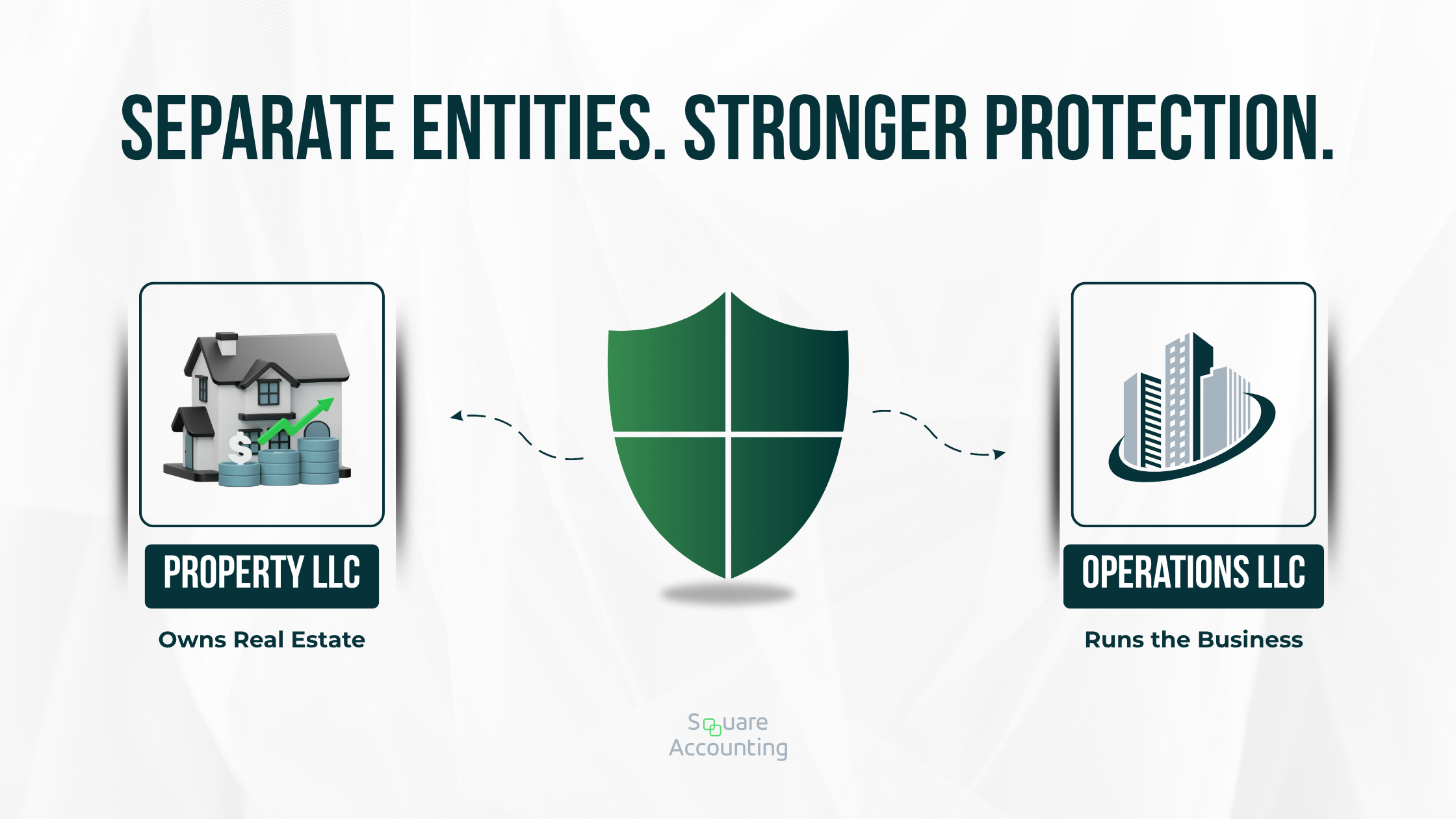Florida Asset Protection Using Separate Entities for Property vs Operations
Why Structure Matters More in Florida
Florida sits at the intersection of opportunity and exposure. Population growth, inbound migration, tourism, and strong rental demand create an attractive environment for real estate investors. At the same time, the state is known for:
Frequent litigation
Volatile insurance markets
Weather related risks
Active plaintiff firms and injury claims
For investors with significant equity or high incomes, a basic LLC is not enough. The real risk is not owning real estate. The real risk is owning real estate and running the business inside the same legal bucket.
A thoughtful entity structure is one of the most effective ways to keep wealth safe while still growing a portfolio.
If you already own Florida property in your personal name or a single LLC, this is the moment to review your structure with a professional. Square Accounting can coordinate with your attorney to evaluate where you stand and what needs to change.
Why Property and Operations Must Be Kept Separate
Property ownership and business operations do not create the same kind of risk.
Property holds equity. It is the store of value.
Operations generate cash flow. They also generate friction, complaints, and potential claims.
When both sit inside the same entity, a single lawsuit can clip both wings at once. A tenant trip and fall claim, an employee issue, a vendor dispute, or a contract breach can all reach the underlying real estate if there is no structural barrier.
Separating property and operations is about containment. It is not about avoiding responsibility. It is about making sure one problem cannot reach everything you own.
If your current setup uses one entity for “everything,” consider that a red flag. Square Accounting can help map out a cleaner, more resilient separation between property and operations.
Florida’s Real Estate Risk Profile: What You Are Actually Up Against
Florida is not a low-friction environment. Investors must contend with:
Storm and hurricane related losses that can trigger large claims and disputes
High tenant turnover in certain markets, increasing interactions and potential conflicts
Strict landlord tenant rules that create regulatory exposure
HOA and condo association disputes, sometimes costly and drawn out
Contractor and vendor issues, especially with construction and repairs
A high volume of personal injury and negligence suits
When assets and operations are blended, any one of these issues can reach across your entire portfolio. The more properties you own, the more that “all eggs in one basket” risk grows.
How Separate Entities Create Real Liability Separation
The solution is straightforward in principle. Split the structure into at least two layers:
Property Entity (or entities)
Holds title to the real estate
Does not run the business
Does not sign vendor or employment contracts
Operations Entity
Manages leasing, communications, maintenance, and staff
Enters contracts with vendors and service providers
Interacts with tenants and the public
If the operations entity faces a lawsuit, the property entity sits behind a wall. If the property entity faces a claim tied to ownership, the operations entity remains insulated. Each entity carries its own risk and protects its own assets.
This is the heart of asset protection using separate entities for property vs operations in Florida.
The Role of a Florida Holding Company
A holding company exists to do one thing well. Hold.
In a Florida real estate structure, a holding company often:
Owns membership interests in several property LLCs
Centralizes oversight and decision making
Keeps itself out of the daily operational mess
A Florida LLC is typically used as the holding company because of its flexibility, charging order protection, and compatibility with real estate planning. The holding company does not manage tenants, hire contractors, or sign maintenance agreements. Activity belongs elsewhere.
This limited function approach is what keeps the holding company clean and hard to attack.
If you own multiple properties across Florida, ask: “Do I have a true holding company, or just a busy LLC doing a bit of everything?” Square Accounting can help you design a true top level structure that reflects your actual scale and risk.
How the Operations Entity Really Works
The operations entity is where real life happens. It:
Negotiates leases
Coordinates repairs
Pays contractors
Manages staff or property managers
Handles tenant questions and complaints
Oversees marketing and rent collection
These activities generate value. They also generate risk. That is why they belong in a dedicated operations LLC or S corporation, not in the same entity that holds property.
The operations entity should be intentionally “asset light.” Minimal hard assets. Minimal equity. Its role is to serve the portfolio, not to accumulate value.
Asset Isolation and Personal Wealth Preservation
For high net worth investors, the goal is not just to protect each property. The goal is to protect everything owned outside the real estate portfolio.
When assets and operations are properly separated:
Claims tend to stay confined to a single entity
Creditors have a harder time reaching other assets
Courts are more likely to respect the corporate veil when formalities are followed
Florida LLC law adds an additional layer by limiting creditor remedies in many cases. The combination of entity separation, proper maintenance, and Florida specific protections can significantly reduce the impact of lawsuits on personal wealth.
Florida’s Legal Environment: Why Formalities Matter
Florida courts do not simply look at your articles of organization and stop there. They evaluate how you actually behave. They tend to consider:
Do entities maintain separate bank accounts?
Are there separate books and records?
Are contracts signed by the correct entity, with correct titles?
Are funds moved with documentation and clear purpose?
Are entities treated as distinct businesses, not as personal accounts?
If the answer to those questions is “yes,” your structure is more likely to be respected. If not, a plaintiff can argue that entities were mere shells and ask the court to ignore the separation.
If you have never performed a “formalities checkup” on your entities, you are flying blind. Square Accounting can review your banking, bookkeeping, and documentation to help you tighten weak spots before they are tested.
Florida Specific Risks That Make Segmentation Essential
Some Florida risks are structural and persistent:
Insurance volatility: Insurers may raise premiums, restrict coverage, or exit the market.
Weather impact: Hurricanes, flooding, and storm related damage increase claim frequency.
Regulatory and HOA friction: Condo and HOA disputes can become expensive quickly.
Personal injury intensity: Sidewalks, stairs, pools, and parking lots invite claims.
When these risks collide with poor entity structure, a single event can put multiple properties at stake. Segmentation is not overengineering. In Florida, it is a rational response to the environment.
Entity Options for Property Ownership in Florida
Florida investors commonly use:
Florida LLCs
Ideal for single property or a small cluster of similar properties
Flexible ownership, simple internal governance
Good fit with estate and tax planning strategies
Series LLCs
Allow internal “cells” under one master LLC
Each series can be treated as a separate unit for liability purposes (subject to proper setup and current legal practice)
Useful for investors with many similar properties who want more segmentation without dozens of standalone entities
Land Trusts with LLC Beneficiaries
Primarily used for privacy and title purposes
The real protective layer comes from the LLC that serves as beneficiary
Helpful when visibility of real estate holdings is a concern
Choosing the right tool depends on property type, portfolio size, and long term goals.
Entity Options for Operations and Management
The operations side is usually structured as:
Florida LLC
Flexible, simple, and well suited to service income
Can be taxed as a disregarded entity, partnership, or S corporation
S Corporation
Useful when operational income reaches a level where payroll tax optimization becomes meaningful
Adds some complexity but can reduce overall tax drag when used correctly
In both cases, the principle is the same. The operations entity manages risk. It does not hold real estate.
Entity choice has tax implications. Before you convert or form a new operations entity, Square Accounting can model the tax impact and coordinate with your legal team so you do not trade protection for unnecessary tax costs.
Avoiding Liability Cross Contamination
Separation on paper is not enough. Day to day behavior can unintentionally reconnect what you worked hard to separate. Common mistakes include:
Using one bank account for multiple entities
Paying personal expenses from business accounts or vice versa
Signing contracts under the wrong entity name
Treating staff as if they work for “you” instead of a specific entity
Using one insurance policy to try to cover several distinct entities improperly
These habits erode the barrier between entities. Over time, they make it easier for a plaintiff to argue that everything should be treated as one pool of assets.
Banking and Accounting Standards for Clean Separation
To keep separation intact, each entity should:
Maintain its own bank account
Have dedicated bookkeeping, ideally with its own chart of accounts
Use entity specific contracts, leases, and vendor agreements
Carry its own insurance policies, tailored to its role
Document transfers between entities as loans, capital contributions, or service payments, not casual movements of money
This creates a clear story. A judge, auditor, or buyer can see how each entity functions, where money flows, and who is responsible for what.
If your current accounting system lumps multiple entities into one set of books, it is time to upgrade. Square Accounting can help you reorganize your financial records so your structure looks as strong in practice as it does on paper.
Scaling With Multi Property, Multi Layer Structures
As portfolios grow, structure matters even more. A common scaling model for Florida investors looks like this:
Each property or group of similar properties sits in its own LLC
These property LLCs are owned by a Florida holding LLC
A separate operations LLC or S corporation manages everything under written service agreements
This multi layer framework offers several advantages:
A problem at one property tends to stay there
The holding company remains insulated from day to day risk
Operations can be upgraded, replaced, or expanded without disturbing the ownership layer
It is scalable, understandable, and investor friendly.
Advanced Strategies for High Net Worth Investors
For high net worth individuals and families, entity separation is often just the first layer. Additional tools may include:
Asset protection trusts, domestic or foreign, to hold membership interests
Family limited partnerships for centralized family control and transition planning
Equity stripping, where debt is used strategically to reduce exposed equity
Jurisdictional diversification, placing certain entities in favorable legal environments
Captive insurance structures for large portfolios with predictable risks
These tools require careful coordination among tax advisors, attorneys, and sometimes estate planners. When executed properly, they create a sophisticated yet manageable framework around Florida real estate holdings.
If your net worth has outgrown your original structure, it is time to revisit your plan. Square Accounting can help you align tax strategy, entity planning, and long term family goals.
How Insurance Fits Alongside Entity Structure
Insurance is an important part of the picture, especially in a state like Florida. However:
Coverage can be limited
Claims can be disputed
Policies can be canceled or non renewed
Entity structure is not a substitute for insurance, and insurance is not a substitute for structure. They work best together. Insurance handles specific events. Entities control how far the damage can travel.
Common Mistakes That Quietly Undermine Protection
Investors often undermine their own protection without noticing. Frequent errors include:
Placing several unrelated properties in a single LLC
Letting the “holding company” sign leases or vendor contracts
Relying on generic online forms that do not reflect Florida specifics
Failing to update operating agreements when ownership changes
Ignoring annual reporting requirements or tax filings
Individually these may seem minor. Collected, they weaken the narrative that your structure is thoughtful, compliant, and worth respecting.
When It Is Time to Redesign Your Structure
Investors often wait for a problem before revisiting their structure. A better approach is to use clear triggers, such as:
Acquiring properties in additional cities or counties
Crossing a certain portfolio value threshold
Bringing in partners, investors, or family members
Changing lenders or adding new financing
Experiencing large premium hikes or coverage changes in insurance
These are natural checkpoints to ask: “Does my current structure still fit my current reality?”
If any of these triggers describe your current situation, it is a strong signal to schedule a structural review. Square Accounting can help you assess risk, refine entity design, and plan ahead rather than react under pressure.
The Value of Multi Year Planning for Florida Investors
Asset protection is not a one year project. It is a multi year discipline. When you plan over a longer horizon, you can:
Align tax strategy with entity strategy
Phase structural changes in a tax efficient way
Coordinate estate planning, lending, and investment decisions
Maintain continuity as your portfolio grows and evolves
This calm, deliberate approach often costs less and protects more than last minute restructuring after a major event.
Working With Florida Focused Advisors
No single advisor sees the full picture. Strong results come when:
Attorneys design the legal structure and documents
CPAs and tax strategists model the tax impact and handle compliance
Financial and estate planners integrate real estate into the broader wealth plan
Square Accounting sits at the intersection of tax and structure. By collaborating with your legal and advisory team, the goal is a framework that is compliant, efficient, and built to withstand real world scrutiny.
Conclusion: A Stronger Path Forward with Square Accounting
Florida is one of the most compelling real estate markets in the country. It is also one of the most unforgiving for investors who rely on informal structures and wishful thinking.
Using separate entities for property vs operations is the foundation of serious asset protection in Florida. It keeps property equity insulated, operations contained, and personal wealth better protected from the unexpected.
With the right design, disciplined implementation, and ongoing oversight, you can grow a Florida portfolio with confidence instead of anxiety.
If you are a Florida real estate investor or high net worth individual and you are not certain your structure truly protects you, it is time for a deeper review. Square Accounting can help you:
Analyze your current entities
Identify weak points and exposure
Coordinate with your legal team
Build a multi year tax and entity roadmap
Take the next step toward a safer, smarter framework. Reach out to Square Accounting to schedule a confidential asset protection and tax strategy consultation.
Frequently Asked Questions: Florida Asset Protection Using Separate Entities for Property vs Operations
1. Why do Florida real estate investors need separate entities for property and operations?
Florida is a high litigation state with strict landlord tenant laws, aggressive plaintiff activity, and volatile insurance markets. Separating property ownership from business operations creates a liability barrier so that a lawsuit against the operating business cannot reach the equity in the real estate. This structural separation is one of the most effective forms of Florida asset protection.
2. What type of entity should hold Florida rental property?
Most Florida investors use a Florida LLC to hold each property or group of similar properties. LLCs provide flexible management, liability protection, and charging order protection. Some investors use Series LLCs for multi property portfolios or pair land trusts with LLCs for privacy and title management.
3. Should the operations entity also be an LLC?
Yes. The operations entity is typically a Florida LLC or S corporation, depending on tax strategy. It handles repairs, tenant interactions, leasing, maintenance, and vendor contracts. This entity must stay asset light so that any operational claim does not risk the property itself.
4. Is it risky to own multiple Florida properties in one LLC?
Yes. Grouping multiple properties in one LLC means a claim at one property can expose all properties inside that LLC. Most serious Florida investors use one LLC per property or a Series LLC structure for better segmentation and protection.
5. Does using separate entities improve protection from tenant lawsuits?
Absolutely. Tenant lawsuits often arise from injuries, habitability disputes, or maintenance failures. By isolating operations in one entity and property ownership in another, you limit legal fallout. The claim stays with the operations entity instead of reaching your real estate equity.
6. How does a Florida holding company fit into this structure?
A Florida holding company serves as the owner of multiple property LLCs. It does not run operations, manage tenants, or sign vendor contracts. Its purpose is to hold equity and keep itself clean from operational risk, improving overall asset protection.
7. Does this structure help high net worth investors more?
Yes. High net worth individuals face higher visibility and deeper claims when litigation occurs. Multi entity structuring keeps liabilities contained, simplifies estate planning, and reduces exposure across a large portfolio. It is a core strategy for wealth preservation in Florida.
8. Is this legal structure a substitute for insurance?
No. Insurance and entity structuring work together. Insurance covers specific events. Entity separation limits the reach of those events. Florida’s insurance market is unpredictable, so relying on policies alone creates unnecessary exposure.
9. What mistakes cause Florida courts to pierce the LLC veil?
Common errors include:
Mixing business and personal funds
Using one bank account for multiple entities
Signing contracts under the wrong entity
Poor bookkeeping
Using the holding company for daily operations
Not keeping operating agreements updated
Courts in Florida prioritize proper corporate formalities. Clean practices equal stronger protection.
10. Does splitting property and operations have tax benefits?
Yes, depending on structure. For example, using an S corporation for operations can reduce payroll taxes. Multiple entities also provide cleaner accounting and allow Square Accounting to optimize multi year tax strategies. A proper review ensures protection and tax planning work together.
11. Can Square Accounting help design and maintain this structure?
Yes. Square Accounting specializes in:
Florida entity structuring
Real estate tax planning
Multi year asset protection strategies
LLC maintenance, compliance, and bookkeeping
Coordinating with attorneys to ensure full legal alignment
Proper planning prevents costly mistakes. Square Accounting ensures your structure stays compliant, clean, and strategically optimized.
12. When should an investor review or rebuild their structure?
You should evaluate your structure if:
You add new properties
Your portfolio value increases
You bring in partners or family members
Your insurance changes or becomes more expensive
Your operations expand in complexity
A structure that worked at two doors may not work at twenty. Regular reviews ensure protection evolves with your portfolio.
13. Is using a land trust enough for Florida asset protection?
No. A land trust can help with privacy and title management, but it does not provide liability protection on its own. The real protection comes from the LLC that serves as the beneficiary of the trust.
14. Do lenders allow property vs operations separation in Florida?
Yes. Lenders commonly finance properties owned through LLCs. The operations LLC does not interfere with financing. In fact, many lenders prefer structures that reduce operational exposure around collateral.
15. How can I get help setting up or improving my asset protection structure?
Square Accounting can conduct a full entity and tax review, identify gaps in your current setup, and coordinate with your legal team to build a durable, Florida optimized asset protection system.







